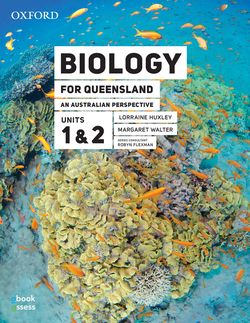Limited Stock Available!
The new Queensland Senior Biology syllabus (to be implemented from 2019) will affect all aspects of teaching and learning – new teaching content, new course structure and a new approach to assessment. As Secondary Publisher of the Year 2017, Oxford University Press is committed to helping teachers and students in Queensland reach their full potential.
Biology for Queensland: An Australian Perspective 3E provides depth and complete coverage of the new syllabus in a format that offers extensive support for teachers and their students. This comprehensively updated two-volume edition covers Units 1 & 2 (Book 1, publishing in 2018), and Units 3 & 4 (Book 2, publishing in 2019).
Key features include:
A Biology Toolkit which is a stand-alone reference section that explains the structure of the syllabus, supports the acquisition of key skills and provides practical tips for success in Biology A Practical Manual which outlines suggested methodologies for every mandatory practical in the syllabus Learning pathways which are clearly mapped directly to the syllabus to ensure complete coverage Assessment support and resources which include exam preparation and practice Coverage of key subject matter which is presented using clear, concise language supported by engaging visual elements and sequenced to scaffold student learning Differentiated teaching which is supported by a range of appropriately levelled questions and activities for each section Inquiry learning and critical thinking approaches which are clearly modelled throughout Additional digital learning resources which support teachers and students.
CONTENTS:
CHAPTER 1: Biology toolkit
UNIT 1 CELLS AND SYSTEMS
CHAPTER 2: The requirements for survival
CHAPTER 3: Cell structure
CHAPTER 4: Cell function
CHAPTER 5: From cell to multicellular organism
CHAPTER 6: Transport and gas exchange
CHAPTER 7: Digestion and excretion in animals
CHAPTER 8: Gas exchange and transport systems in plants
Unit 1 Practice exam questions
UNIT 2 MAINTAINING THE INTERNAL ENVIRONMENT
CHAPTER 9: Coordination and control
CHAPTER 10: Control of temperature and water balance
CHAPTER 11: Disease and its causes
CHAPTER 12: Identifying, monitoring and controlling disease
Unit 2 Practice exam questions
CHAPTER 13: Practical manual















